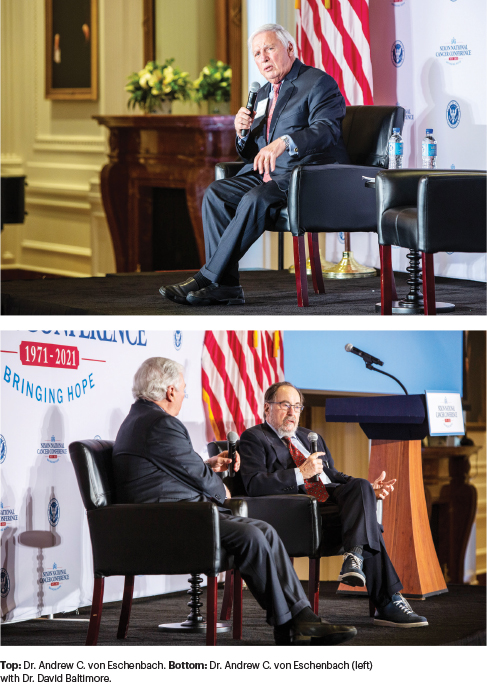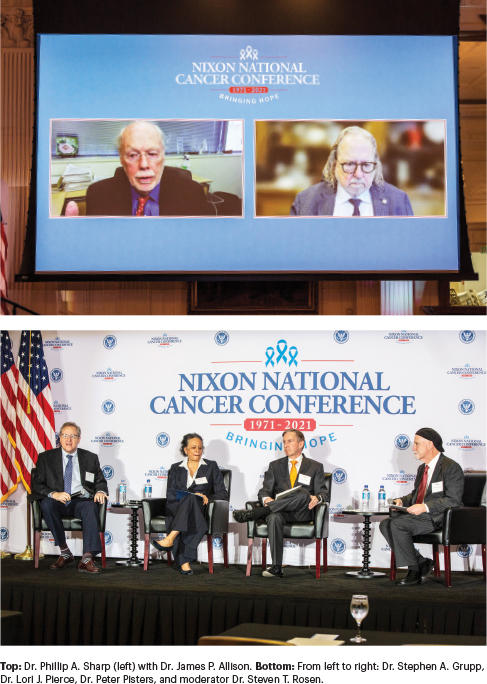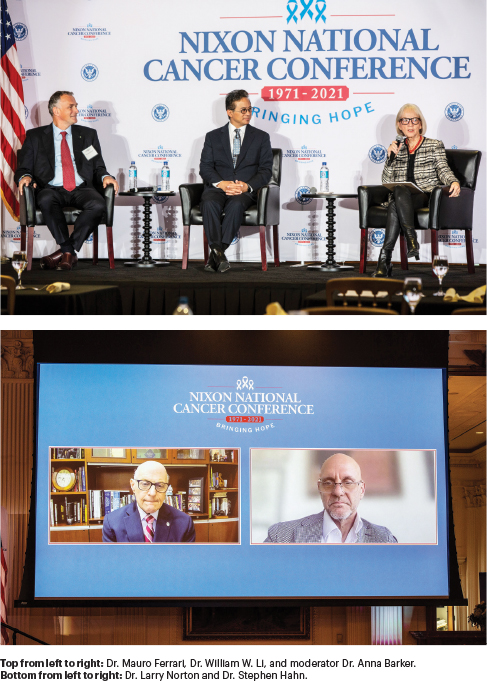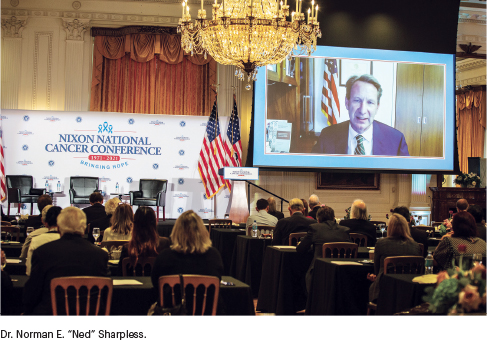In December 2021, Nobel laureates, cancer center directors, physicians, scientists, politicians, public health officials, and patient advocates gathered at the Richard Nixon Presidential Library and Museum in Yorba Linda, California, to celebrate the 50th anniversary of the signing of the National Cancer Act of 1971. They also met to predict how the advances made in cancer care over the past 5 decades may propel the next 50 years of progress. When President Nixon signed the National Cancer Act, he declared: “I hope in the years ahead, we will look back on this action today as the most significant action taken during my administration.”1

All photos appear courtesy of the Richard Nixon Presidential Library and Museum.
The unprecedented legislation granted sweeping authority to the director of the National Cancer Institute (NCI) to develop a national cancer program that included the NCI, other research institutes, and federal and nonfederal programs; funding to establish 15 new cancer research centers and local control programs; and an international cancer research databank. The legislation also established the first NCI-designated cancer centers, which today number 71, located across 36 states and the District of Columbia, and expanded the National Clinical Trials Network to focus scientific efforts on the understanding, prevention, detection, and treatment of cancer.
Since the National Cancer Act went into effect, cancer survivorship has soared from just 3 million in the 1970s2 to more than 17 million today. And that number is expected to climb to more than 22 million over the next decade, and the 5-year survival rate is expected to increase to 70%.3
Evaluating the Impact of the National Cancer Act
The 2-day meeting, titled the “Nixon National Cancer Conference 1971–2021, Bringing Hope,” was chaired by Andrew C. von Eschenbach, MD, President of Samaritan Health Initiatives and Adjunct Professor at The University of Texas MD Anderson Cancer Center. Dr. von Eschenbach is former Director of the NCI from 2002 to 2005 and former Commissioner of the U.S. Food and Drug Administration from 2005 to 2009.
The conference included a keynote address by the Director of the NCI, Norman E. “Ned” Sharpless, MD, and three panel discussions that explored the past, present, and future of cancer treatment and research. The first panel discussion, “The National Cancer Act—Discovering Cancer’s Secrets,” was moderated by Dr. von Eschenbach and included three Nobel laureates:
• James P. Allison, PhD, Regental Professor and Chair of the Department of Immunology, the Olga Keith Wiess Distinguished University Chair for Cancer Research, and Director of the Parker Institute for Cancer Research
• David Baltimore, PhD, President Emeritus and Distinguished Professor of Biology at the California Institute of Technology (Caltech)
• Phillip A. Sharp, PhD, Institute Professor and Professor of Biology, Member, Koch Institute for Integrative Cancer Research at the Massachusetts Institute of Technology.
The second panel discussion, “The National Cancer Act—Saving Lives, From Hopelessness to Hope,” was moderated by Steven T. Rosen, MD, Chief Scientific Officer and Provost at City of Hope, and included the following thought leaders:
• Stephen A. Grupp, MD, PhD, Section Chief of the Cellular Therapy and Transplant Section at Philadelphia Children’s Hospital
• Lori J. Pierce, MD, FASTRO, FASCO, Immediate Past-President of ASCO and Professor, Radiation Oncology and Vice Provost for Academic and Faculty Affairs at the University of Michigan
• Peter Pisters, MD, President of The University of Texas MD Anderson Cancer Center.

The final panel, “The National Cancer Act—Changing the Future of Cancer,” was moderated by Anna Barker, PhD, Chief Strategy Officer at the Lawrence J. Ellison Institute for Transformative Medicine of the University of Southern California and former Deputy Director of the NCI, and included the following panelists:
• Stephen Hahn, MD, Chief Medical Officer, Flagship Pioneering/Moderna and former Commissioner of the U.S. Food and Drug Administration
• William W. Li, MD, Chief Executive Officer, President, and Medical Director of the Angiogenesis Foundation and author of Eat to Beat Disease: The New Science of How Your Body Can Heal Itself (Balance, 2019)
• Mauro Ferrari, PhD, Affiliate Professor, Department of Pharmaceutics, Pharmaceutics Affiliate Faculty at the School of Pharmacy at the University of Washington
• Larry Norton, MD, Senior Vice President, Office of the President; Medical Director, Evelyn H. Lauder Breast Center; and Norma S. Sarofim Chair in Clinical Oncology at Memorial Sloan Kettering Cancer Center.
Opening Remarks
Dr. von Eschenbach: “I have lived this dream, and it has been an unbelievable experience to see the progress that has occurred over these past 50 years. [During this conference], we will spend time with three panels that will walk through some of that journey with us. The first panel will involve Nobel laureate-basic scientists to talk about this revolution in science; back in 1971, a physician like me was working in a paradigm of observing manifestations of disease: feeling a lump in a woman’s breast and seeing a shadow on an x-ray and calling it a lung tumor. But what the National Cancer Act enabled us to do is go from observing manifestations to being able to unravel the fundamental mechanisms of cancer on the molecular and cellular levels and that, of course, has transformed science.
“The second panel will focus on many of the advances that have been made in cancer therapy based on that progress in science and the infrastructure that the National Cancer Act created. The third panel will take that progress and project it into the future in which cancer and cancer’s progress and foundation are now serving as a platform for all diseases. What we will see in the future with the continued commitment is not being cancer-centric, but cancer-led as this National Cancer Act has created a trajectory to transform all disease, acute and chronic.”

Panel I: The National Cancer Act—Discovering Cancer’s Secrets
To begin, Dr. von Eschenbach discussed the impact the National Cancer Act had on researchers’ understanding of how viruses cause cancer with Dr. David Baltimore. Dr. Baltimore shared the Nobel Prize in Physiology or Medicine in 1975 with Renato Dulbecco, MD, and Howard Temin, PhD, “for their discoveries concerning the interaction between tumor viruses and the genetic material of the cell.”
Dr. Baltimore: “I chose to work on viruses because they were the simplest form of life. And I thought we could make advances that took advantage of the knowledge, the centrality of nucleic acid, and the structure of nucleic acid, which had been elucidated by Watson and Crick in 1953. It was a good choice because it was the only organism, if you call a virus an organism, that was simple enough to manipulate that you could begin to understand its fundamental nature.…”
“I am a basic scientist and love working on basic mechanisms. I think it’s important that there be a cadre of people who do not respond to the urgency of the patient with cancer but drive knowledge deeper and deeper into the nature of the normal cell processes and how those get bastardized in a way by cancer cells. However, I also have always thought it important that we test our knowledge by trying to apply it because it may be too early. It may be that we don’t know enough. It may be that we don’t have a right context for treatment, but it may be that we do know enough.”
Next, Dr. Sharp and Dr. Allison discussed how the National Cancer Act has impacted the evolution of science and accelerated treatments for cancer. Dr. Sharp was awarded the Nobel Prize in Physiology or Medicine in 1993 for his work in the discovery of split genes. Dr. Allison was awarded the Nobel Prize in Physiology or Medicine in 2018.
Dr. Sharp: “I want to speak a little bit about the basic science side of cancer, how we understand the nucleus and the cell, and how the National Cancer Act impacted that. In the National Cancer Act, there was the acknowledgment of the need to get a greater understanding of the human cell. That led to a number of basic cancer centers….
“Because of the National Cancer Act and the expansion of Cold Spring Harbor [Laboratory] with the support of a National Cancer Program Project Grant, I was able to find a position with Jim Watson at Cold Spring Harbor; there, I launched my career into studying how viruses interact with cells to cause cancer, because we could manipulate viruses at that stage. And it gave us a tool to probe these processes in a very specific way….

“I have seen this blossoming of our knowledge of the cell due to the contributions of the enormous [scientific] community. But that community was nucleated and supported by the leadership, resources, and national effort to have impact on the lives of patients by advancing our understanding of cancer and treatment of cancer. That has been a tremendous success story.”
Dr. Allison: [The National Cancer Act] has been a terrifically big influence [on my career]. I was a graduate student at The University of Texas at Austin when the [National] Cancer Act was passed. I was studying biochemistry but got involved in some tumor projects and did some experiments; they led me to show…that we could cure mice of cancer with chemotherapy, basically, and then rechallenge them, and they were forever immune to rechallenge. I switched to immunology and got a job at MD Anderson, which I think was made possible in 1975 by funds from the NCI. I started my work there trying to understand how T cells worked….
“I began receiving extramural grants from the NCI, which funded my work in T cells and the notion that if you can block these inhibitory signals…, you can unleash the immune system to treat cancer…. I still consider myself a basic immunologist. But the bottom line is that most of the clinical work we started doing was with melanoma…. What we’re doing now is trying to extend [survival] to other cancers; we’ve got a ways to go…, but it’s a start.”
Panel II: The National Cancer Act—Saving Lives, From Hopelessness to Hope
Moderator Dr. Steven Rosen asked the panel members to express the most profound legacy of the National Cancer Act.
Dr. Pisters: “I think probably among the many contributors that we all see now, and are discussing, is the ability to bring clinicians and researchers together in synergistic ways that nobody even imagined at the time. This created opportunities for discovery and then to create solutions that we’re now seeing and are benefiting patients and saving lives.
“I think it really took cancer research from an obscure area to a coordinated national effort. And we’re really seeing 50 years of progress as a result.”
Dr. Pierce: “I think about what I do every day when I see patients. I’m a breast cancer radiation oncologist, so I see Mrs. Smith. And I can take the imaging information, the genomic information, the clinical information, and then derive a treatment recommendation, individualized, based upon Mrs. Smith’s tumor. That is all possible because of the National Cancer Act.…
“We think about 50 years ago. It was a one-size-fits-all [treatment], and now we can individualize [treatment] based upon the specifics of Mrs. Smith’s cancer.”
Dr. Grupp: “What excites me most at this moment, in addition to being able to provide transformational therapies to patients, is we’ve talked about ‘bench to bedside.’ You have these patients, kids in our hospital who are having transforming responses to brand-new fields of medicine, whether it’s immunotherapy with checkpoint inhibitors or, in our case, with CAR T [chimeric antigen receptor T-cell therapy.
“Then you take their cells right back to the lab, with incredible techniques developed by the basic scientists to interrogate actually what’s happening. So, you can understand these things in a rapid, iterative fashion, none of which would have been possible without this infrastructure and focus on cancer.”

Panel III: The National Cancer Act—Changing the Future of Cancer
Dr. Barker: “Larry, what do you think is going to change cancer research and cancer, as we know it, for patients in the next decade?”
Dr. Norton: “Because of the National Cancer Act, the funding of the NCI, the cancer centers, the development of science, and the evolution of science, we know lots and lots of pieces about what makes cancer tick and how to treat it properly. The thing that we’re not very good at is getting those pieces together into one big picture….
“There’s a philosophy of convergence, and I think the biggest changes are going to happen by the convergence of various fields. Bringing this all together in one big picture, I think is really what’s going to make the difference. Many people have said over the years that we probably already know the answer to cancer. We just don’t know that we know it because we haven’t seen the connections between these various things. I think the next decade or two is going to bring a convergence of these ideas, and we’re going to see a dramatic change in our ability to diagnose, treat, [and] prevent cancer.”
Dr. Hahn: “One of the key aspects from the National Cancer Act and investments we’ve seen in cancer, biology, basic science, and translational research centers not just on the advances that we’re seen in cancer, but with other diseases [as well]. I’m going to argue here that the investments we’ve made in biology and understanding the basics of biology, and genomics of cancer have led to our understanding of DNA and RNA transcription and translation. And I believe we wouldn’t have had mRNA platforms leading to two of the most successful vaccines we’re seen and helped us move forward in COVID….
“In addition to all the things we have to do to push science forward and to translate that into the benefit of humankind and identify disease early, we have to make sure everything we do for the advancement of science and the treatment of disease is available to everyone—including those who are most distrustful of us and those who have the least access to care.”
Dr. Ferrari: “Can I shake it up a little bit? Respectively and lovingly, we need theory, we need math, we need definition, because we don’t even agree what it is that we are fighting, and we need technology platform. And all of the above, not in a way that is antagonistic to what has been biologic cancer research, that is, of course, necessary, it’s fundamental. However, these four additional pieces are every bit as key to get into the other side, changing cancer the way it is today for the better, in a way that would bring a true resolution.”
Dr. Li: I think that recognizing what the National Cancer Act allowed us to do over the past 50 years is to dive deeply into that complexity to generate the bits of information that now we need to aggregate back together. And this is to, in part, answer the question, why do we get cancer?
“Given the fact that we know mutations, genetic abnormalities are part of the cause of cancer, and our environment plays a substantial role in it, including our diet and lifestyle. One of the questions I think the future is going to bring up, and we’re going to address, is not why do we get cancer, but why don’t we get cancer more often?
“I wonder whether we could use the same rigorous tools…for drug development and actually study food using those same systems. That’s really kind of the emerging field of molecular nutrition or food is medicine in a more colloquial sense. There’s evidence that foods can actually target cancer stem cells.... This is a highly dispersed field, early field of research, that uses the same tools of molecular biology and cancer research to take a look at what foods can actually do….
“To make a breakthrough for the future, to make equality and access available to everyone, we cannot simply rely on chasing the horse out of the barn using expensive drugs. We need to look at prevention as the ultimate leveling of the playing field for cancer. And I believe that food and nutrition is part of that solution.”
Keynote Address
Dr. Sharpless: “From my point of view, the National Cancer Act did three important things. First, it provided increased funding for cancer research. Second, it granted the NCI a whole bunch of new authorities and capabilities like clinical trials infrastructure, and [the] Frederick National lab, and the SEER [Surveillance, Epidemiology, and End Results] program, and really the modern cancer center program. And those authorities and capabilities were very, very important.
“The last thing I think it did, which is tremendously important, is it removed the stigma around the diagnosis of cancer. Prior to the National Cancer Act, cancer was a disease that was spoken about in sort of hushed tones. And this Act, really in this advocacy movement, brought cancer into the limelight and made it a diagnosis one could discuss in public. It thereby, created the modern cancer advocacy movement, which has been so important to our progress in cancer over the past 50 years.”
REFERENCES
1. National Cancer Institute: Cancer Facts & the War on Cancer. Available at https://training.seer.cancer.gov/disease/war/. Accessed on January 21, 2022.
2. Parikh RB, Kirch RA, Brawley OW: Advancing a quality-of-life agenda in cancer advocacy: Beyond the war metaphor. JAMA Oncol 1:423-424, 2015.
3. National Cancer Institute: Cancer Statistics. Available at www.cancer.gov/about-cancer/understanding/statistics. Accessed on January 21, 2022.

